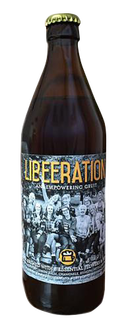News
A Crafty Brew to
TACKLE MENOPAUSE SYMPTOMS
Menopause is a natural part of the ageing process that women do not necessarily look forward to. But in the US, a new craft beer may be about to make it easier for women to manage unpleasant physical symptoms. GlobalData takes a look at the innovative development
Menopausal women now have a beer they can call their own. Libeeration, a new limited-edition craft beer for menopausal women, is rich in botanical ingredients thought to alleviate menopausal symptoms.
Libeeration is described as "an empowering gruit" form of beer with fruity, spicy, and earthy notes that is brewed with eight essential flowers and herbs. Dry hopped with a small dose of Saphir hops in the secondary fermentation to add a tangerine note to the finish, the beer contains botanical ingredients believed to alleviate menopausal symptoms including motherwort, lemon balm, chamomile, stinging nettle, mugwort, rosebuds, chickweed, and damiana.

Menopausal women may be overlooked as a target market for beer
Portsmouth Brewery, the maker of the product, consulted with women's health practitioners and herbalists while concocting this new brew. Libeeration's herbal and floral ingredients largely replace hops as a bittering agent and are believed to help relieve common menopausal symptoms such as hot flashes, anxiety, irritability and sleepiness. The gruit-style of beer originates from Europe and uses herbs in place of hops. Libeeration has an ABV of 6.1%.
Tom Vierhile, innovation insights director for GlobalData, says: "The subject of menopause is rarely addressed in packaged food and drink products, but is a very real health issue for women from their mid–40s on up. At the very least, Libeeration helps celebrate or mark this significant life stage in a way that could be memorable. The drink may also give menopausal women a reason to stick with beer and not stray to alternatives like wine, though the implied health claims for Libeeration may be suspect given that alcohol can act as a trigger for symptoms like hot flashes."
He adds: "Menopausal women may be overlooked as a target market for beer and Libeeration provides a bonding catalyst for women of that age. Women in the target age group for the product see personalisation in a positive light. According to a 2016 Q3 GlobalData survey, 47% of women in the 45–64 year age group have a more favorable perception of products making claims that are personalised to their needs."

Menopausal women now have a beer they can call their own. Libeeration, a new limited-edition craft beer for menopausal women, is rich in botanical ingredients thought to alleviate menopausal symptoms.
Libeeration is described as "an empowering gruit" form of beer with fruity, spicy, and earthy notes that is brewed with eight essential flowers and herbs. Dry hopped with a small dose of Saphir hops in the secondary fermentation to add a tangerine note to the finish, the beer contains botanical ingredients believed to alleviate menopausal symptoms including motherwort, lemon balm, chamomile, stinging nettle, mugwort, rosebuds, chickweed, and damiana.
Portsmouth Brewery, the maker of the product, consulted with women's health practitioners and herbalists while concocting this new brew. Libeeration's herbal and floral ingredients largely replace hops as a bittering agent and are believed to help relieve common menopausal symptoms like hot flashes, anxiety, irritability, and sleepiness. The gruit-style of beer originates from Europe and uses herbs in place of hops. Libeeration has an ABV of 6.1%.

Menopausal women may be overlooked as a target market for beer
Tom Vierhile, innovation insights director for GlobalData, says: "The subject of menopause is rarely addressed in packaged food and drink products, but is a very real health issue for women from their mid–40s on up. At the very least, Libeeration helps celebrate or mark this significant life stage in a way that could be memorable. The drink may also give menopausal women a reason to stick with beer and not stray to alternatives like wine, though the implied health claims for Libeeration may be suspect given that alcohol can act as a trigger for symptoms like hot flashes."
He adds: "Menopausal women may be overlooked as a target market for beer and Libeeration provides a bonding catalyst for women of that age. Women in the target age group for the product see personalisation in a positive light. According to a 2016 Q3 GlobalData survey, 47% of women in the 45–64 year age group have a more favorable perception of products making claims that are personalised to their needs."